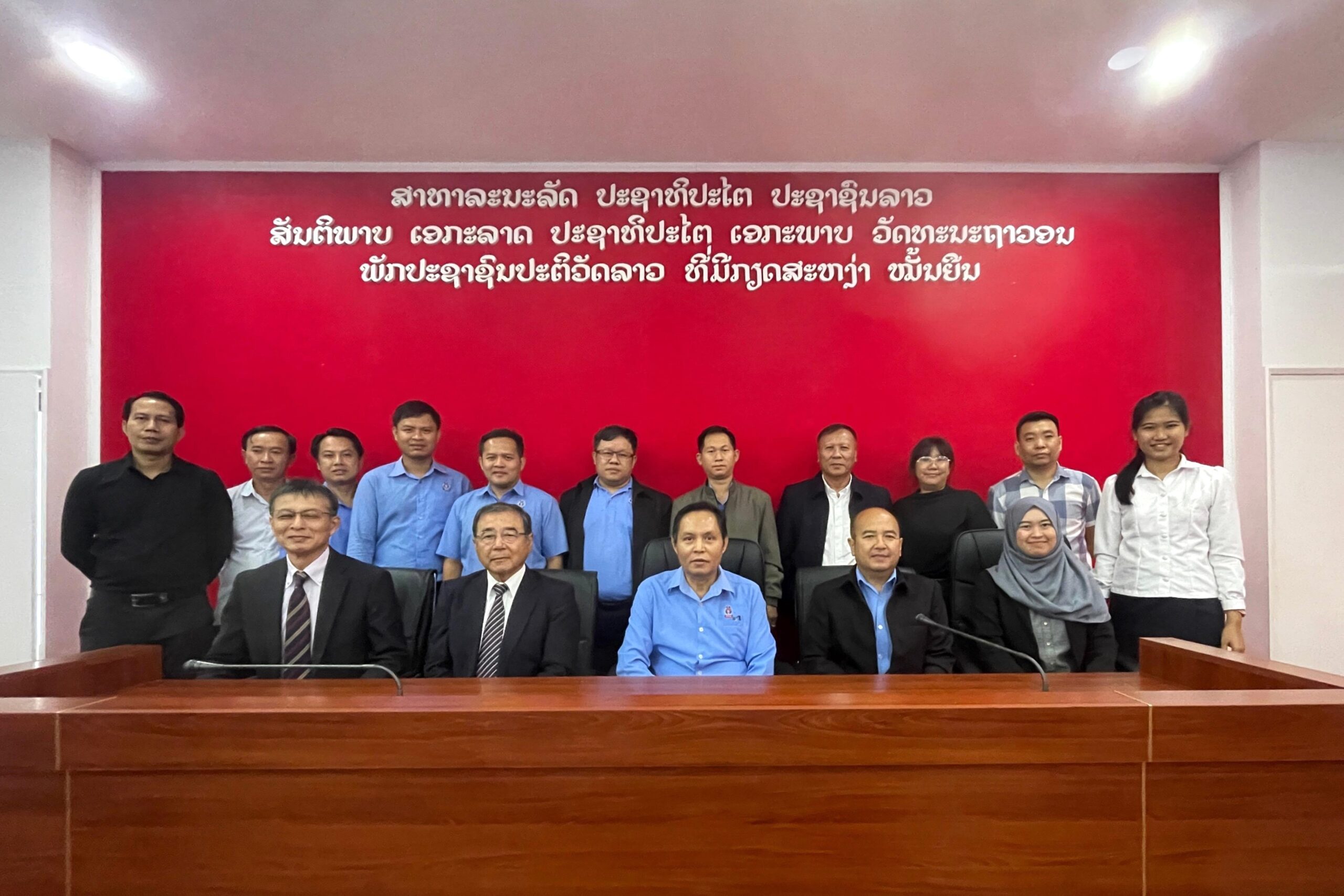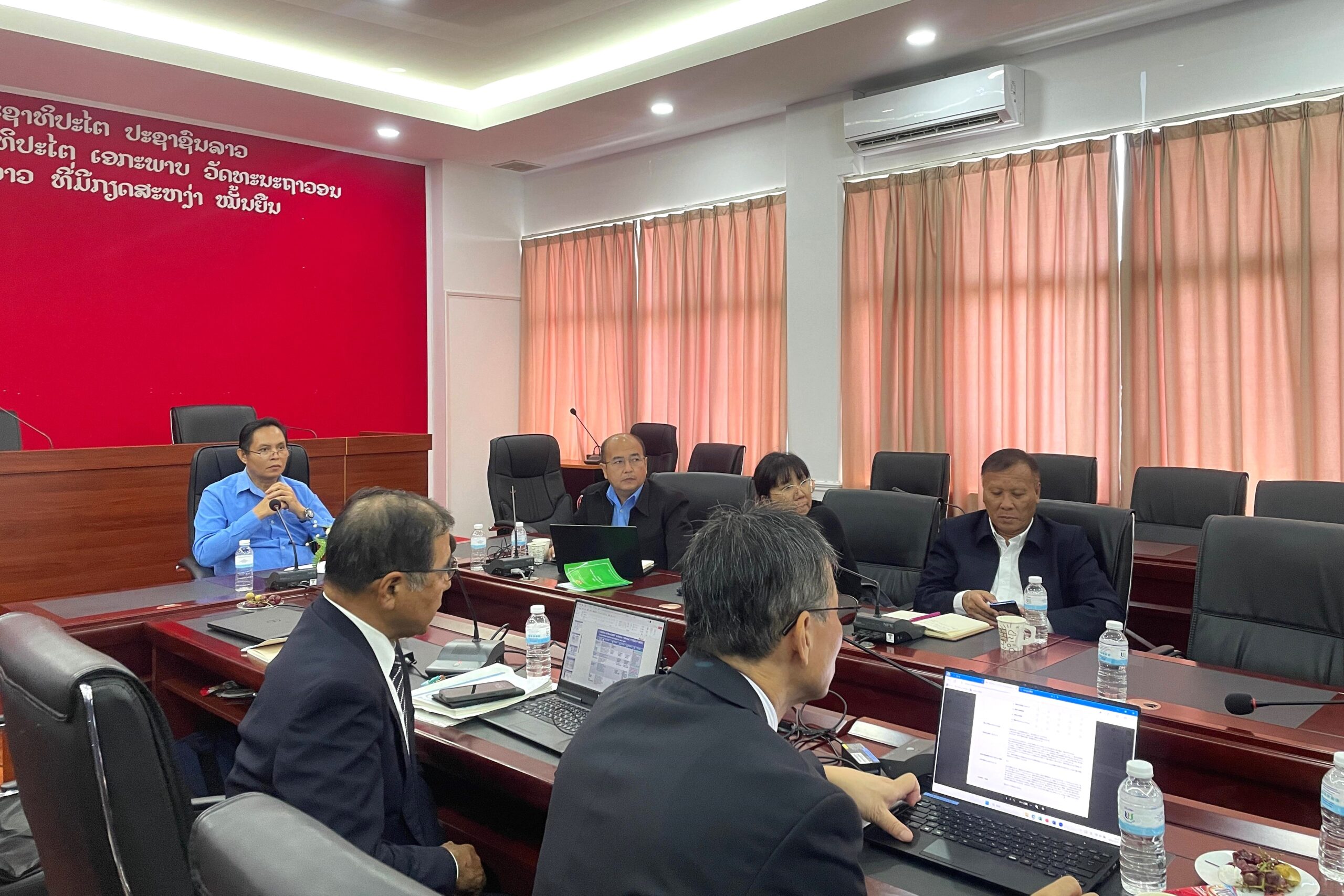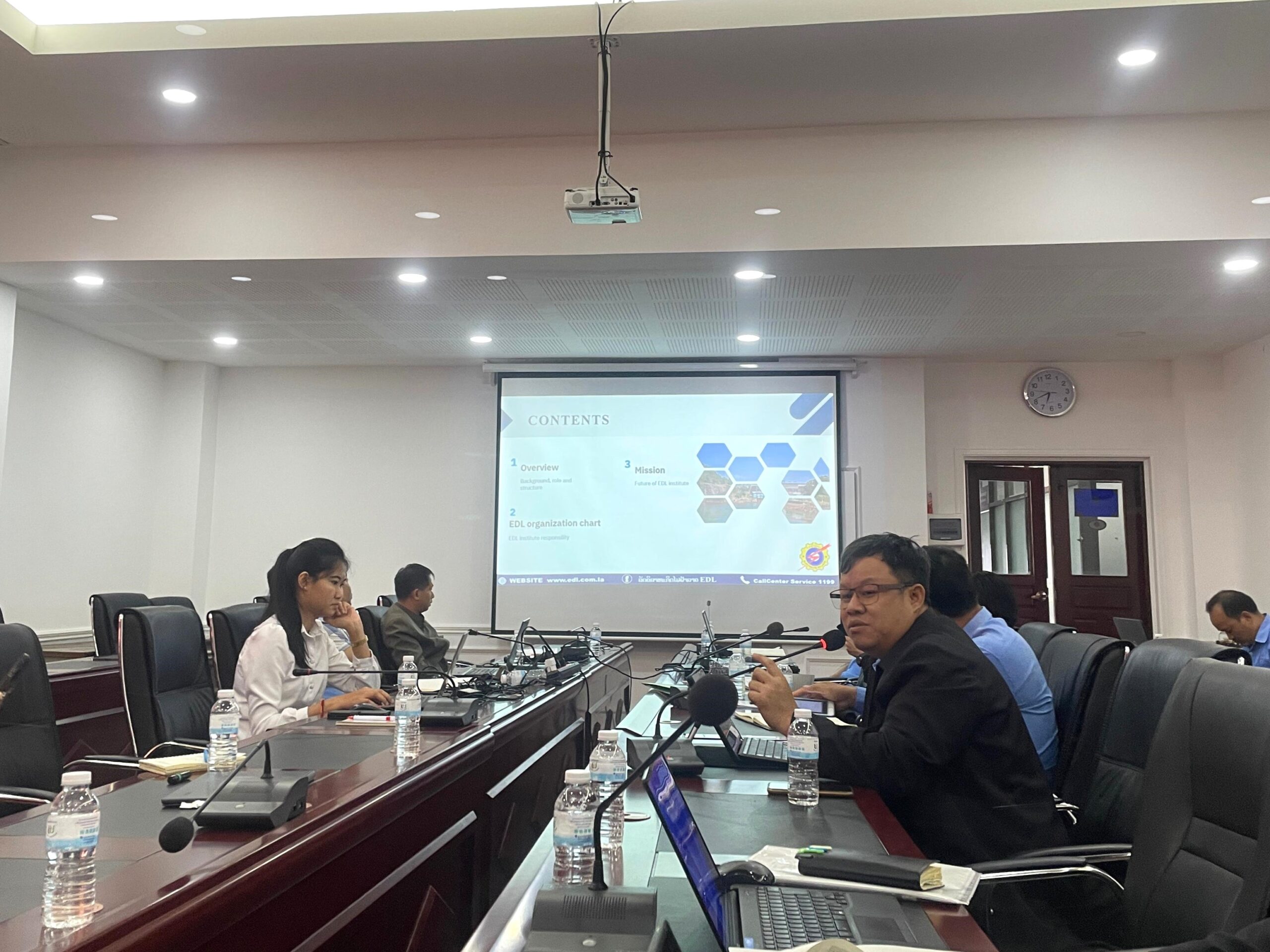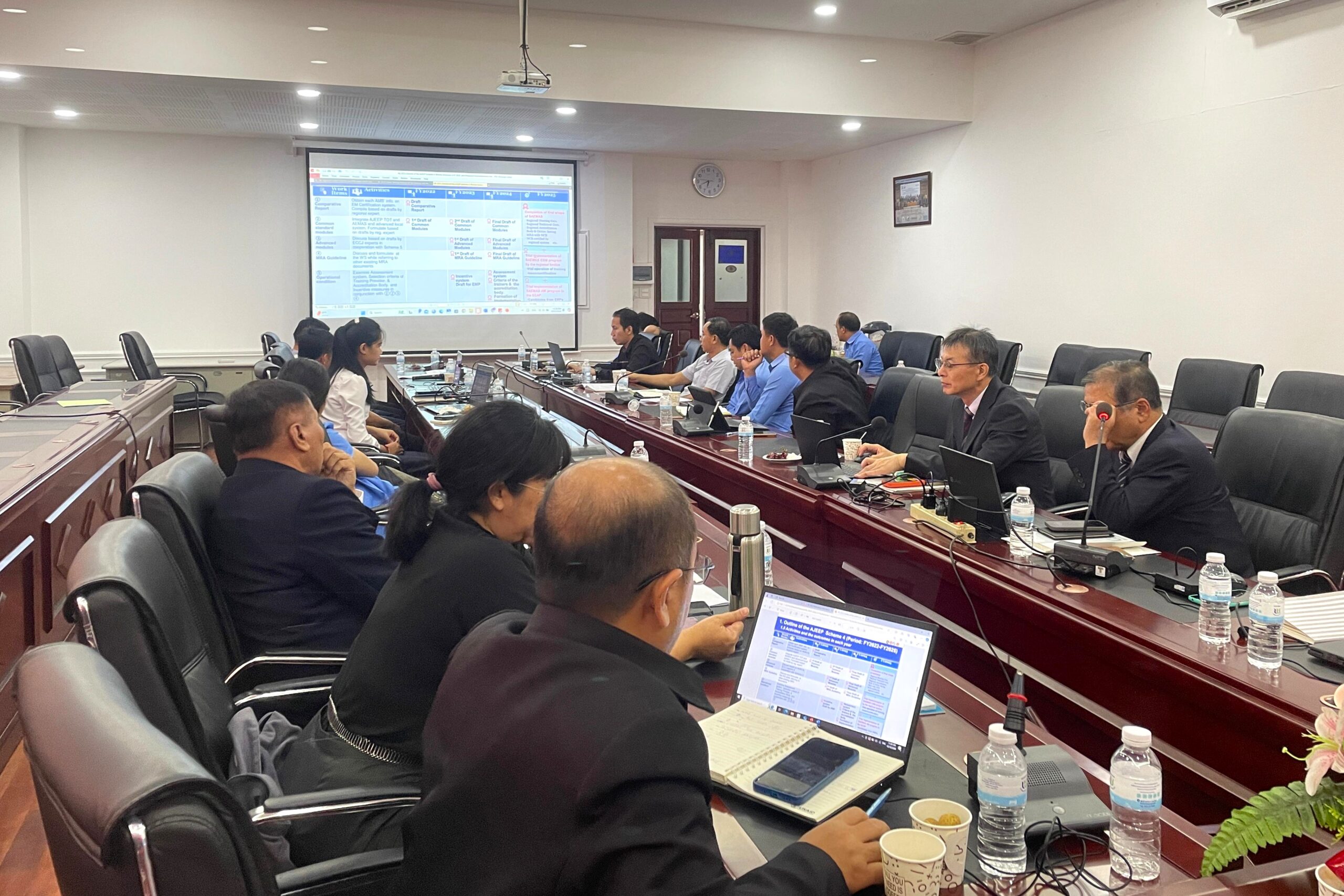Menu

Photo 1. Participants of the AJEEP Scheme 4 Country Visit Meeting to Lao PDR
The ASEAN Centre for Energy (ACE), in collaboration with the Energy Conservation Center Japan (ECCJ), conducted a country visit to Lao PDR under the ASEAN-Japan Energy Efficiency Partnership (AJEEP) Scheme 4. The meeting took place on 10 October 2024 at the Department of Energy Efficiency and Promotion (DEEP), Ministry of Energy and Mines (MEM) Headquarters, Vientiane, Lao PDR. Participants included officials from MEM, representatives from ACE, ECCJ, National University of Lao, Electric Du Lao, Research Institute of Energy and Mines, Department of Industrial Management, and Department of Housing and Urban Planning.
AJEEP is a regional cooperation initiative between ASEAN and Japan, implemented by the ACE and ECCJ with financial support from Japan’s Ministry of Economy, Trade, and Industry (METI). This initiative aims to strengthen Energy Efficiency and Conservation (EE&C) policies and practices in the region through capacity building. The current phase, Scheme 4, is focused on developing the Sustainable ASEAN Energy Management Certification Scheme (SAEMAS).
As part of AJEEP Scheme 4, the country visit to Lao PDR aims to share updates on SAEMAS development, discuss the progress of the energy management certification program with the energy management technical working group in Lao PDR, and explore potential collaboration to integrate SAEMAS to the Lao PDR national certification framework. The meeting was led by Khammanh Sopraseurth, Deputy Director General, DEEP, MEM.

Photo 2. Khammanh Sopraseurth, Deputy Director General of the Department of Energy Efficiency and Promotion (DEEP), leading the meeting.
The meeting commenced with Takakazu Oikawa from ECCJ presenting the results of the 10-year AJEEP Scheme 3, which concluded in 2021. The scheme aimed to support the development of S&L operations and Energy Management Systems (EnMS) in Lao PDR through local training and workshops. Key achievements include the approval of the Prime Minister Decree on Energy Efficiency and Conservation on 11 May 2020, and advancements in the EnMS, such as setting thresholds for designated buildings and industries, implementing periodic reporting, creating an Energy Conservation (EC) guideline, and drafting a qualification system for Energy Managers.
DEEP of MEM followed the presentation by sharing the status of energy efficiency regulations in Lao PDR. The EC Guideline and EM Manual were established as foundational documents, leading to the Decree on Energy Efficiency and Conservation. This decree set the stage for the Draft Regulation on Energy Management for Designated Factories and Buildings. By 2025, a working group comprising key organisations—DEEP, Research Institute for Energy and Mine (RIEM), Electricité du Laos Institute (EDLI), Demand Side Management (DSM), the National University of Laos, The Lao National Chamber of Commerce and Industry (LNCCI), Ministry of Industry and Commerce, Ministry of Public Works and Transport (MPWT), and the Association of Construction Architects—will finalise the EM Decision to strengthen energy management across sectors.
MEM is currently establishing a Committee for Certified Energy Managers, which will involve EE&C WG, Examination Board, and Training Provider. DEEP has requested support for developing the Energy Manager certification, including curriculum creation, a training workshop on EM and setting up the EM system. The contributions are being made by DEEP, the Research Institute for Energy and Mines, EDLI, and other relevant sectors.

Photo 3. Presentation Session by Electricité du Laos (EDL)
EDL, a state-owned enterprise operating under the MEM and the Ministry of Finance (MOF), presented the functions of its EDL Institute, which include training center and research and development (R&D) center. The institute provides training in areas such as administration, mechanical engineering, hydro-power generation, and substation and transmission systems. One of its key missions is to implement certification programs for engineers and technical specialists. EDL aims to collaborate on developing various areas related to the EDL Institute and EDL Center, focusing on future improvements, especially with SAEMAS.
Mardika Firlina, Associate Officer of Energy Efficiency and Conservation (CEE) Department at ACE presented the positioning of the SAEMAS regional system within the APAEC Phase II, highlighting a comparative assessment of energy management system policies, certification schemes, and competencies across ASEAN. With CLM countries planning to implement energy management systems, the need for certified energy managers may rise, supporting professional mobility within ASEAN. ACE proposed a new structure for SAEMAS, aiming to align regional certification with national systems, though further consultation is needed to harmonise practices.

Photo 4. Discussion during AJEEP Scheme 4 Country Visit Meeting
The meeting continued with Yoshitaka Ushio from ECCJ outlining the timeline for AJEEP Scheme 4, covering FY2022–FY2025, the activities completed during 2023–2024, and the proposed plans for 2024–2025. For Lao PDR, a key recommendation is to begin with a simplified certification system tailored to the nation’s current needs and capabilities, leveraging support from AJEEP Scheme 2’s Training of Trainers (ToT) graduates. Moving forward, the SAEMAS Working Group aims to finalise the Common Standard Modules (CSM) and draft the Advanced Modules (AM), while also setting up operational conditions for a trial run in 2025.
In conclusion, the AJEEP Scheme 4 visit to Lao PDR highlighted the nation’s progress in advancing its National Energy Manager Training Certification System, with a focus on aligning it with ASEAN energy management standards. While the program is still in development stage, DEEP is actively collaborating with EDL as training provider and NUOL as Committee for EM Curriculum Development. Despite progress, DEEP highlighted the need for additional capacity-building initiatives to support EM development, acknowledging that the program faces challenges in establishing a strong foundation within Lao PDR.
